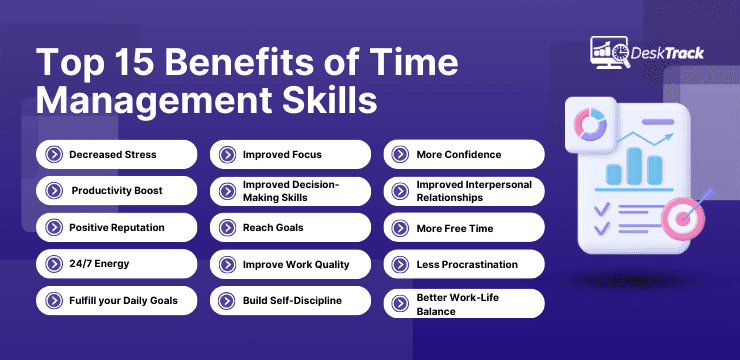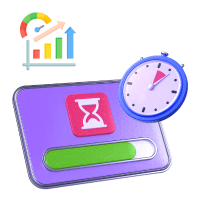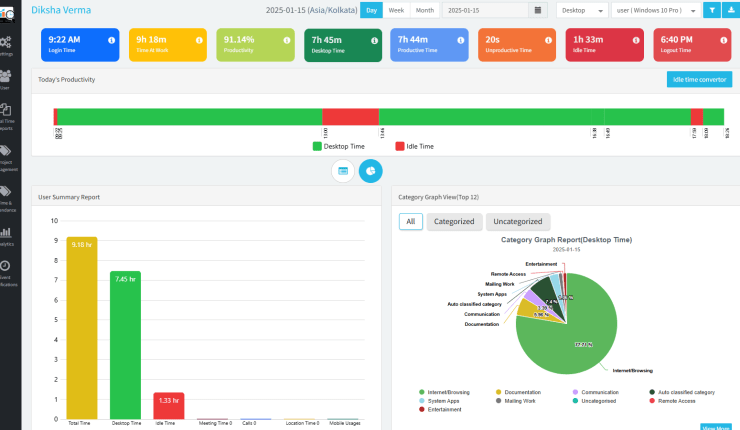There are many benefits of time management skills. Period. What separates successful people from the non-successful ones is that the former effectively manage their time. Whether you are a student, employee, leader, professional, or even a retired person, knowing how to effectively balance your hours daily is an important skill. So, in this post, we will take on the nitty-gritty of hour management, which is equivalent to life management. Today, we will give you the A to Z around this important skill and some important tips for work-life balance success. With that being said, let’s get started.
What is Time Management?
work-hour management is the art of being efficient with your time, so you can get more done and achieve more in less time. It is about being able to shift from one activity to another and back again without losing momentum. Managing Time is a difficult skill, but becoming more efficient with your time will help you gain control over your life. Planning, staying focused, and getting things done efficiently are all aspects of properly managing time. It’s about how to manage your time so that you can achieve goals, handle stress, and make the most of your life.
Why is Time Management Skills Important for Employees?

Due to the benefits of time management skills, employees must possess this necessity. Properly managing hours enables employees to prioritize their tasks and complete them efficiently, leading to increased productivity and job satisfaction. Additionally, it reduces stress by allowing employees to meet deadlines and avoid last-minute rushes.
Furthermore, good hours management skills enable employees to maintain a better work-life balance, allowing them to pursue their interests and spend time with their loved ones. It reflects reliability, efficiency, and productivity. Another benefit of time management is Employers highly value employees, leading to increased career advancement opportunities. To ensure they are performing optimally, managing their workload effectively, and achieving both professional and personal goals, effectively managing their time is crucial for employees.
Top 15 Benefits of Time Management Skills

So, now we know the importance of hours management skills. However, the advantages don’t just stop there. Learning how to properly manage your time is beneficial in your personal and professional life. With that being said, we handpicked 15 advantages from the work-life perspective.
1. Decreased Stress
Decreased stress is one of the best benefits of time management skills, allowing employees to stay in a relaxed mode. If you are distressed because of the peer pressure of the professional workload, learning to manage your time can reduce your stress level. If you manage your working time properly then you will find your work is done always on time.
Thus, hours management skills remove working pressure from you. It allows you to schedule the smaller parts of your day so that the projects and tasks can be completed in a given time. Even if it takes a long time, you still feel confident.
2. Productivity Boost
One of the benefits of time management skills is you can complete the task in a better way. When you learn to manage your time, your productivity will be increased & you can complete your deadlines in a limited time without stressing out.
3. Positive Reputation
You will understand the importance of managing time when you have a better reputation at work. You will always do work on time without error or pressure.
When scheduling time management and work, your colleagues and employer will be impressed with you. You can leave a different aura in your circle. You will be known as someone who doesn’t push tasks off for the next day. You can make other people motivated and confident. Building a positive workplace reputation can increase career advancement, salary growth, and satisfaction.
4. 24/7 Energy
One of the biggest benefits of time management skills is maintaining all-day energy. If you are feeling tired and showing zero productivity after working hours, it means you need to build up your hour-balancing skills. Effective strategies will let you know when to complete a task. It ultimately helps to reduce the energy spent at work.
5. Fulfill your Daily Goals
Do you have goals for what you need daily? By knowing the best hours management strategies you can simplify the day and spend less time deciding what to do. It will teach you how to plan out the daily objectives and determine the problems you should battle.
6. Improved Focus
One of the benefits of time management skills is improved focus. When you know how to manage your hours properly, you can identify how to dedicate a specific amount of time to each project. When you deal with multiple responsibilities, you might be juggling so many things in your mind. Therefore, it would be better to schedule the daily tasks to eliminate this. Hour management skills make a person more focused.
7. Improved Decision-Making Skills
Managing time and building a work schedule helps improve decision-making skills. It can improve the other aspects of your life. The process of making decisions also improves the ability to prioritize things.
8. Reach Goals
another benefit of time management skills is it helps you reach your goals faster. Developing goals doesn’t matter until you have the frequencies to reach them.
The time management technique teaches you how to set bigger goals and reach them in the shortest time.
9. Improve Work Quality
Want to improve the quality of work? When you make effectively managing time your habit, you can spend more time improving your ability and quality of work. You can complete each task in the assigned time, making you confident and enhancing your professional career. It allows you to find better ways of working.
10. Build Self-Discipline
A very lifelong benefit of time management skills is you can improve schedule planning. Hour management will train you in the best possible way. You can give your full attention to your career and put all your energy into completing the work at the right time.
Read Also – Top 15+ Time Keeping Software & Apps in 2025
11. More Confidence
When you are more skilled at managing time, you become more confident at work. Due to frequently completing tasks within the time limit, you achieve a sense of self-satisfaction, which boosts your enthusiasm.
12. Improved Interpersonal Relationships
One of the benefits of time management skills that helped us grow in our professional lives is improved interpersonal relationships. When you know how to properly manage your hours, colleagues look to you and can trust you with short and long errands.
13. More Free Time
One of the reasons for the importance of managing time properly is that you are left with more free time. When you know how to schedule and properly manage your time blocks, you will do everything in a streamlined way, leaving you with no stress and more free hours to wrap it all up.
14. Less Procrastination
Overthinking or procrastination is the biggest enemy of productivity. When you overthink ‘How am I supposed to do that in this much time’, it’s a red flag and your brain completely shuts down. As opposed to this, the benefit of time management skills is less procrastination, leading to more productivity.
15. Better Work-Life Balance
As we mentioned before, properly managing time leaves you with more free time. Remember that those hours are yours. It means that you can do anything in that slot. For example, relax, meditate, have fun, spend time with family and friends, and eliminate the need for overtime. The possibilities are endless.
Top 5 Tips for Time Management at Work in 2025
So, now we know the benefits of time management skills, it’s essential to also wrap our heads around these skills to gain these advantages. With that being said, here are a few expert tips to properly help you manage your time and achieve more success.
1. Prioritize Your Tasks
An Important hours management strategy is task prioritization. Make a to-do list and prioritize your tasks in order of importance. This will help you focus on the most critical tasks first and ensure that you’re making progress on your most important work.
2. Use of Technology
Using the latest tools and technologies greatly helps you manage your time and gain all the benefits of time management skills. You can manage your time more effectively with many employee time-tracking software and apps available today. Maintain your schedule by using tools such as DeskTrack for task management and time tracking.
3. Break Down Tasks
One of the most useful hours management skills is this one. How? Large projects can be daunting. However, breaking them down into tasks will help you simplify the project, regardless of its complexity. By doing so, you’ll be able to maintain your concentration and move the job along without getting overwhelmed.
4. Take Breaks
Experts give this tip for getting the benefits of time management skills all the time. Maintaining focus and preventing burnout is possible with regular breaks throughout the day. It is important to take short breaks every hour or so to recharge and refocus.
5. Avoid Distractions
One of the important parts of work-hour management is distraction avoidance. The most important thing you can do is minimize distractions as much as possible. Using your phone or computer with notifications on is a waste of time. So, turning them off, closing unnecessary tabs, and refraining from multitasking is a wise decision.
Why is DeskTrack the Best for Simplifying Time Management for Employees?
DeskTrack is the best time-tracking software for your on-site, in-office, and remote teams. With over 100K users in 8K organizations across 100+ nations using it, this software solution for tracking work hours is the most well-known, providing these features.
- Automated task timers and timesheets that improve focus and efficiency.
- Real-time time-tracking for hassle-free management.
- The most accurate work-time utilization reporting features.
- Automated idle time, work-time, billable, and non-billable hours calculation.
- Seamless integrations, the most user-friendly interface, and much more.
Conclusion
We hope you now understand the benefits of time management skills and how important it is to learn them. Knowing how to properly manage your time will lead you to perform optimally, manage your workload effectively, and achieve both professional and personal goals. For the same, it is always wise to follow expert tips, which will go a long way, leading you to more success. However, to track your time and manage it properly, using software’s assistance will give you an edge over others. We strongly suggest using DeskTrack as your ideal choice.
Frequently Asked Questions (FAQ)
Q. What is Work-Hour Management?
Ans. Work-hour management or time management is the formula for short and long-term success in life. Managing your hours means taking charge of your fixed time in a way that every work goes according to plan. This way, you will get more efficient at work and balance it properly with your personal life.
Q. What are The Advantages of Learning Hours Management Skills?
Ans. Learning and mastering how to properly manage your time quickly will give you many benefits. These include:
- 1. Decreased Stress
- 2. Productivity Boost
- 3. Positive Reputation
- 4. 24/7 Energy
- 6. Improved Focus
- 7. Improved Decision-Making Skills
- 8. Reach Goals
- 9. Improve Work Quality
- 10. Build Self-Discipline
- 11. More Confidence
- 12. Improved Interpersonal Relationships
- 13. More Free Time
- 14. Less Procrastination
- 15. Better Work-Life Balance
Q. What are Some Expert Tips for Effective Time Management?
Ans. To gain all the work-hour management benefits, following some expert tips will go a long way to success. Here are a few of them.
- Prioritize Your Tasks
- Use of Technology
- Break Down Tasks
- Take Breaks
- Avoid Distractions













